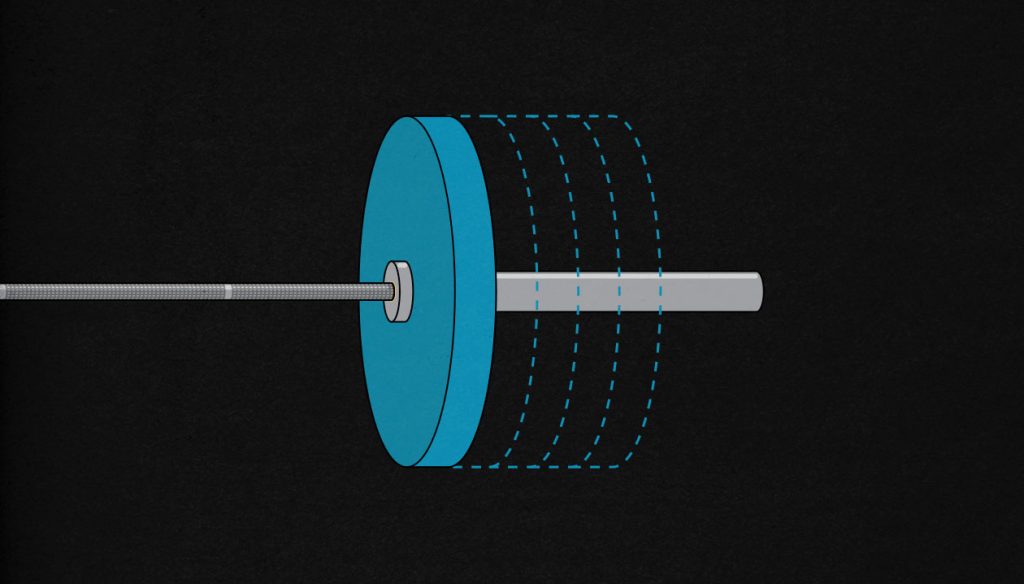
Muscle Size and Strength Standards for Ectomorphs
How much muscle and strength can an “ectomorph” gain? Plenty of research has looked into rates of muscle and strength gain, but what if you’re a naturally skinny guy? Are there different strength standards for us?
Skinny guys do start off with less muscle mass, but what effect does that have on how quickly we can grow? Do we have an extended period of newbie gains, allowing us to gain muscle and strength more quickly? Or does having less muscle mass indicate that our genetics are poor, causing us to build muscle more slowly?
We have thinner bones and narrower frames, and we tend to start off weaker. Does that limit how strong we can become?
In this article, we’ll go over two main questions from an ectomorph’s perspective:
- How much muscle can an ectomorph gain in his first year? Most guys can expect to gain around twenty pounds of muscle during their first year of lifting weights. How does that change for an ectomorph?
- How strong can an ectomorph get after a year of lifting weights? With a good workout routine, most guys are able to bench press 225 pounds (100kg), squat 315 pounds (140kg), and deadlift 405 pounds (180kg). Are these numbers realistic for ectomorphs?
- What’s an ectomorph’s lifetime muscular genetic potential? If we lift for a lifetime, how big can we hope to get?
- How strong can an ectomorph get with a lifetime of serious training? If we develop our muscles to their full potential, how strong can we hope to become?
Let’s dive in.

How Much Muscle Can an Ectomorph Gain in a Year?
Before we can talk about how much muscle “ectomorphs” can build, we need to understand what sets us apart from the average guy. The main difference is that by the time the average man reaches adulthood, he’s naturally accumulated a fair amount of muscle mass on his frame, partly due to his genetics, partly from gradually becoming overweight. Compared to us ectomorphs, he’s far closer to his genetic muscular potential. (You can calculate your genetic muscular potential here.)
When the average guy makes newbie gains, he’ll be able to gain around two pounds of muscle per month, which, to be clear, is an incredible rate of muscle growth. As ectomorphs, though, many of us can dwarf those newbie gains:

Now, to be clear, your results will surely vary. Everyone has a different frame, different muscle shapes, and slightly different genetic potential. You can see a wider variety of bulking transformations here. We also have an article going over average bulking results.
Overall, on average, the skinnier a guy is, the more quickly he can build muscle.
How is that possible, though? Doesn’t the research disprove this? The research shows that the average guy can gain about two pounds per month. Studies show far greater rates of muscle growth than that, but, at least on average, most experts agree that a lifter following a good bulking program can realistically expect to gain about two pounds of muscle per month.
However, the research also shows that rates of muscle growth vary highly from person to person. While gaining two pounds of muscle per month may be the average, some guys are able to gain muscle up to three times as quickly (study).
If we look at GK’s before and after photos, instead of gaining two pounds of muscle per month, he’s appearing to gain more like six pounds. Mind you, not all of his weight gain is muscle. At least a few of those pounds are other forms of lean mass—denser bones, more connective tissue, and so on—and surely there’s some fat in there as well. Still, he’s gaining muscle far more quickly than the average guy could ever hope to.
Do Hardgainers Gain Muscle More Slowly?
Don’t hardgainers have worse muscle-building genetics? When I first started trying to build muscle, I assumed that being skinny meant that I wouldn’t be able to build muscle very quickly. That was confirmed by the fact that I was trying everything I could to gain weight and still couldn’t get the damn scale to budge.
Furthermore, the term “hardgainer” is sometimes used to describe someone who struggles to gain muscle. The way we use the term, though, a hardgainer is someone who struggles to gain weight.
I know that sounds like a weird distinction to make, given that bulking up requires gaining both body weight and muscle mass. However, our struggle to gain weight has little to do with our muscle-building genetics and more to do with “hardgainers” having faster metabolisms or smaller appetites.
In my case, at least, I wasn’t failing to build muscle because I was having a poor response to lifting weights. Rather, I was failing to build muscle because I wasn’t gaining any weight overall. I wasn’t able to eat enough calories to gain weight. My problem was that I wasn’t eating a sufficient bulking diet.
Once we learn how to eat enough calories, skinny guys tend to respond incredibly well to lifting weights. With a proper bulking program, we’re often able to exceed all the expected rates of muscle growth, even while keeping our gains fairly lean.
Hardgainers Start With Less Muscle Mass
Although we don’t gain muscle more slowly, we do start off with less of it. A study published in 2000 in the Journal of Applied Physiology determined that the average man weighs around 200 pounds and has about 80 pounds of muscle mass on his frame (study). Over the course of his life, he might be able to add another forty pounds of muscle to that, accumulating 120 pounds of muscle overall.
A naturally skinny guy, on the other hand, might only weigh 130 pounds. He’ll likely have slightly thinner bones, a narrower frame, and a smaller stomach, which accounts for some of the weight difference, but most of the weight difference is due to the fact that he’s carrying far less muscle and fat. Obviously, there are different degrees of hardgainers, but for the sake of this example, let’s say that the hardgainer only has around forty pounds of muscle by the time he reaches adulthood. He’s starting behind the starting line.
Muscle Growth Has a “Catch-Up” Mechanic
If you read our newbie gains article, then you know that the further away from our genetic potential we are, the faster we’re able to grow. This is because the slow part of building muscle is the process of adding more nuclei to our muscle fibres, like so:
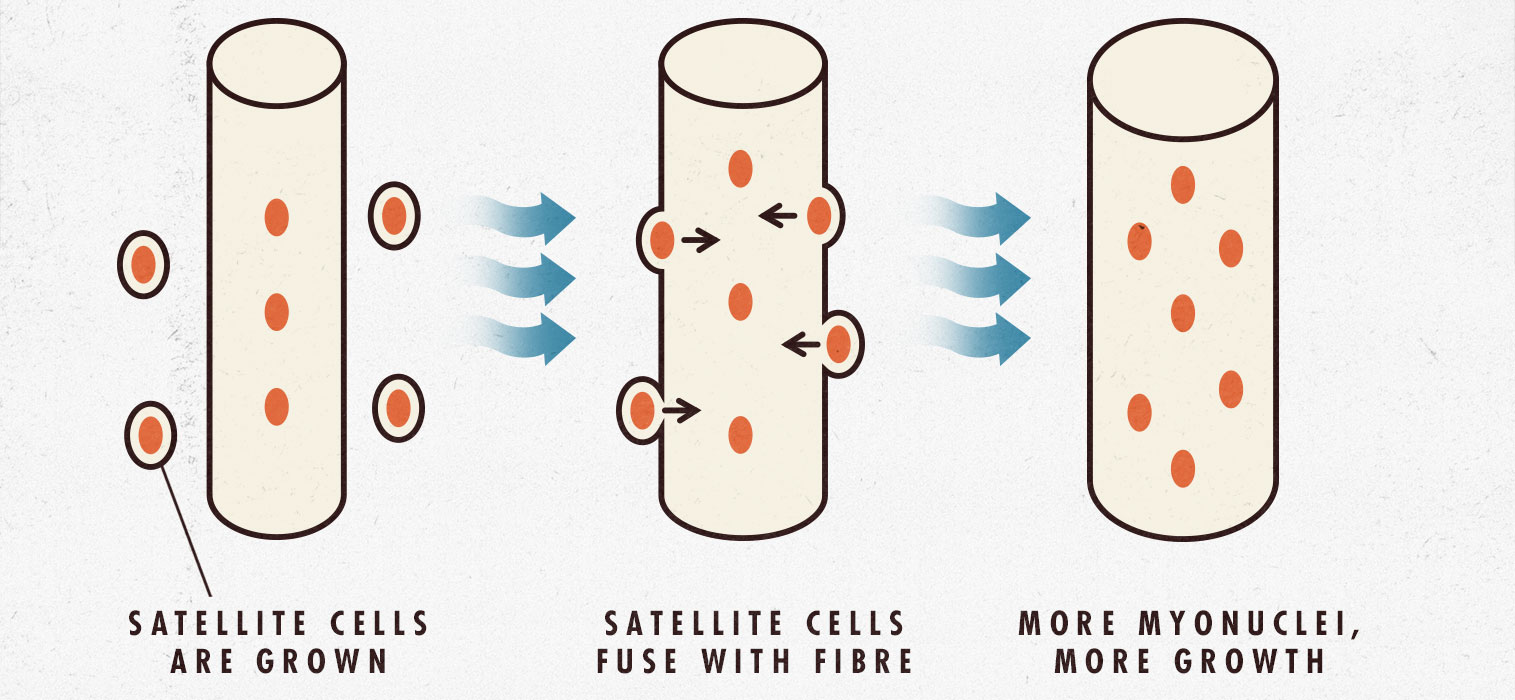
Newbies don’t need to do that. When we’re far enough away from our genetic potential, the nuclei in our muscle fibres are still capable of managing larger areas, meaning that we can gain muscle without needing to increase the number of nuclei in our muscles fibres, like so:
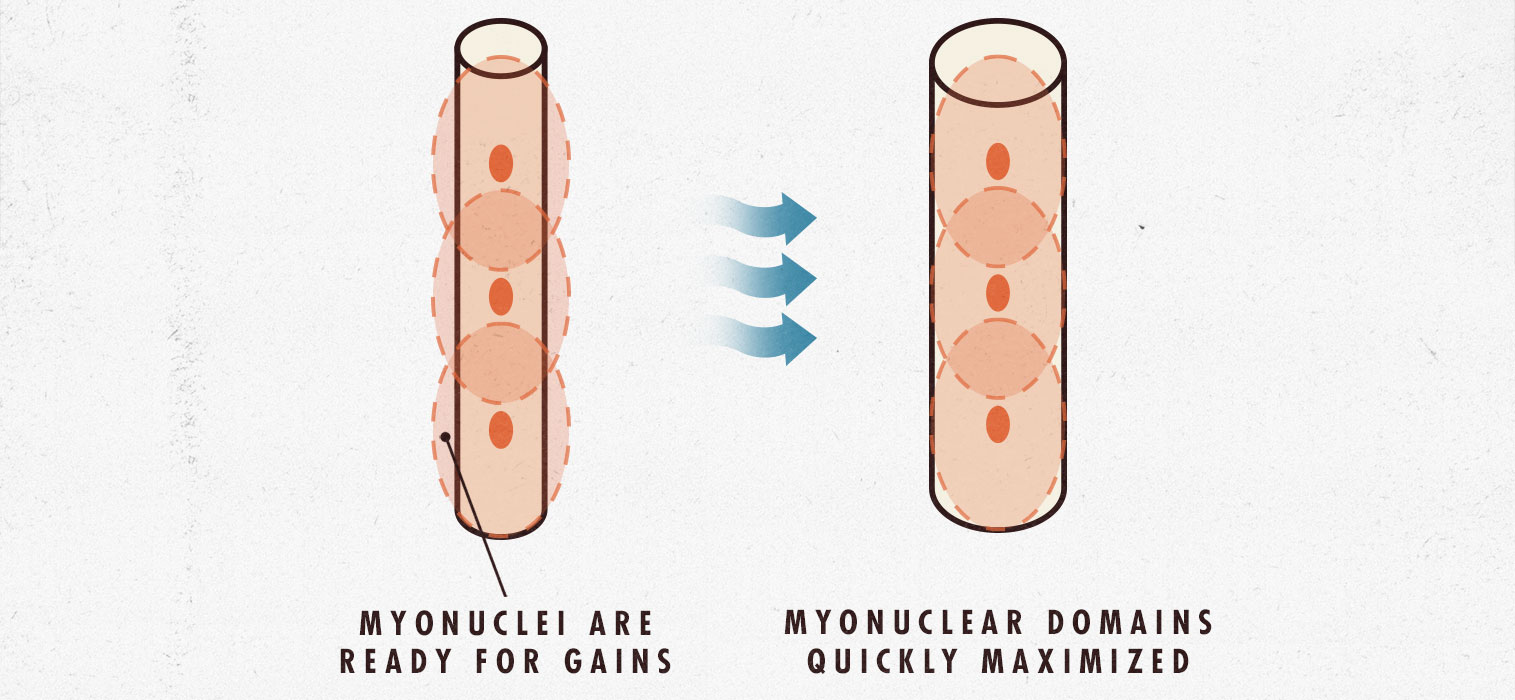
Admittedly, this example is oversimplified. Other factors contribute to the slowing rate of muscle growth as well (such as the repeated bout effect). The main takeaway, though, is that our muscles grow quickly at first, and then as we get closer to our genetic potential, our rate of muscle growth slows. We get progressively diminishing returns:
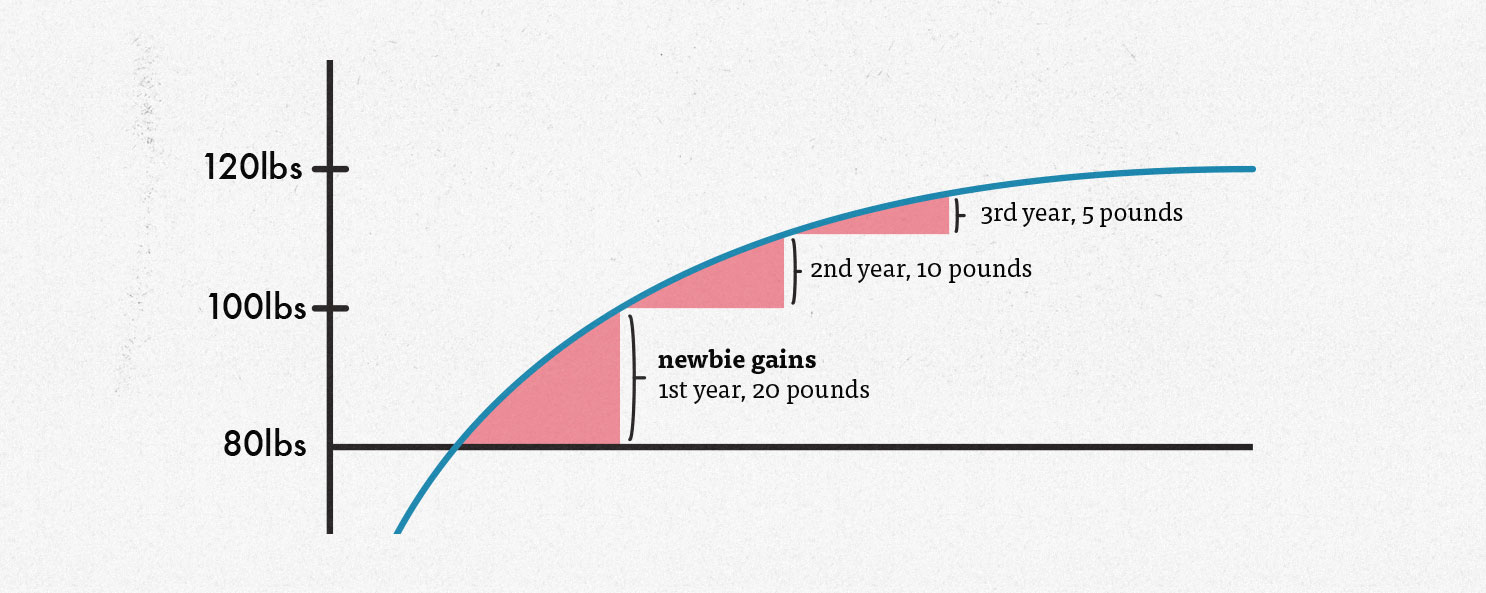
However, given that we’re starting so far away from our genetic potential—and here’s where a bit of speculation comes in—we’re starting at the best possible point on the growth curve: right at the very beginning.
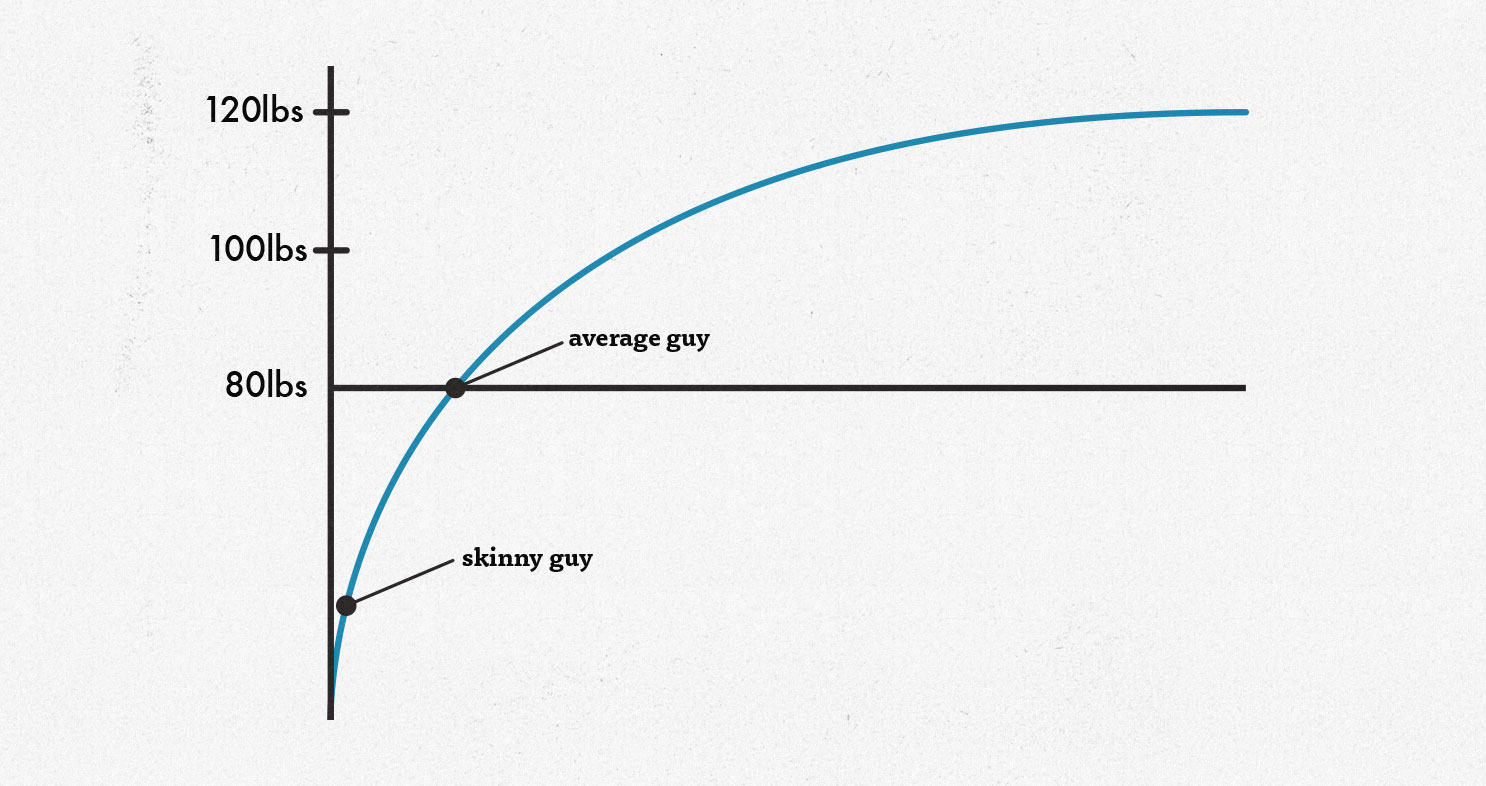
This seems to explain why guys who are starting out thinner than average are able to build muscle at such a tremendous pace. I suspect that our muscle growth trajectory looks more like this:
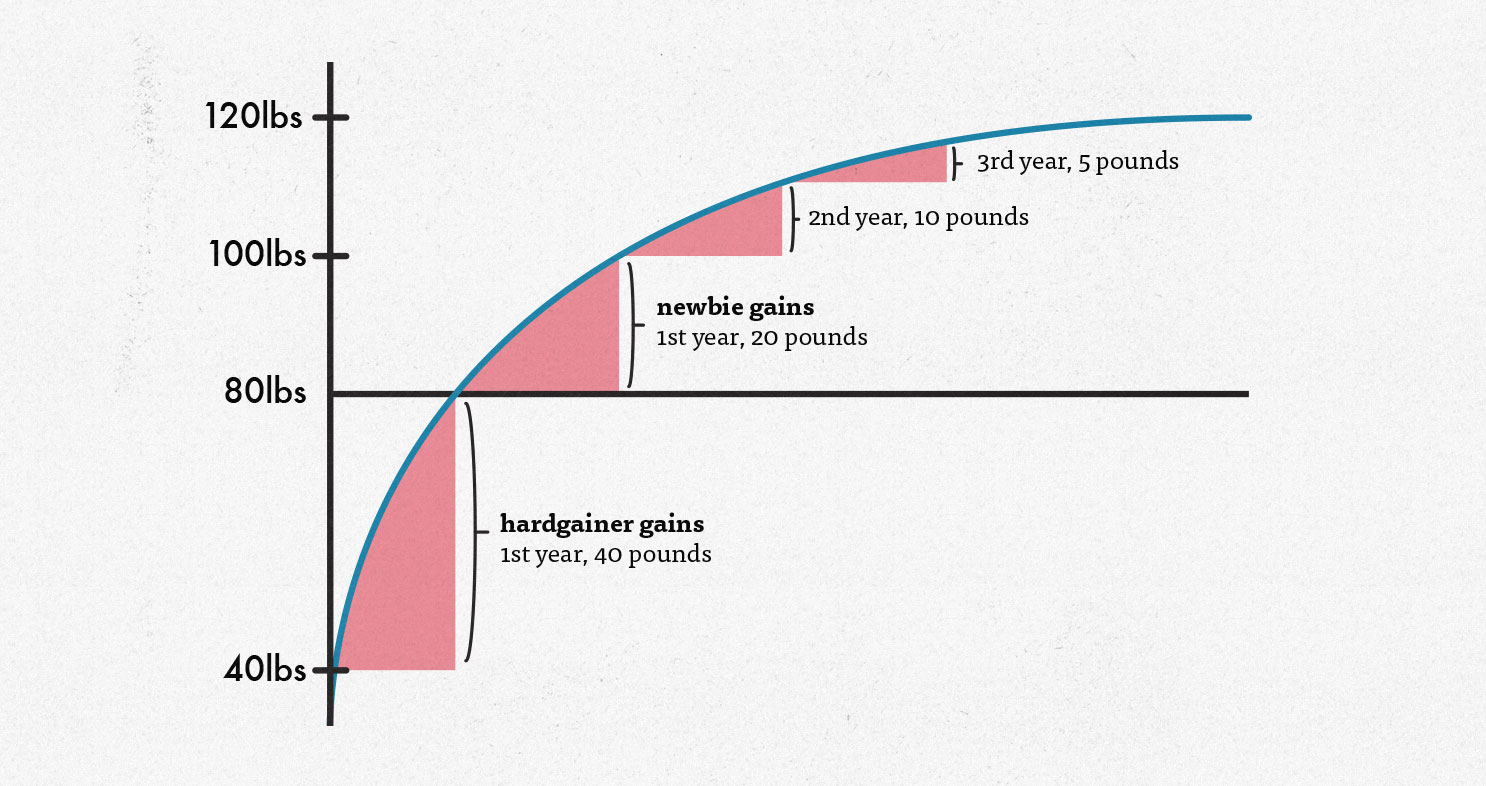
Muscular Genetic Potential for Ectomorphs
Now we’ve arrived at the issue of our genetic muscular potential. As naturally skinny hardgainers, how far away from our genetic potential are we? After all, it doesn’t matter how close to the average genetic potential we are, it matters how closer to our genetic potential we are.
The best researcher looking into this question is Casey Butts, Ph.D., who found that the genetic muscular potential of a hardgainer is about 5–10% lower than the average man (due to having thinner bones and smaller frames). So if the average man can hold around 120 pounds of muscle, we hardgainers can expect to hold about 108–114 pounds of muscle.
That’s a genetic disadvantage, sure, but not a significant one. In fact, given how few people get anywhere even close to reaching their genetic potential, nothing is stopping us from becoming far stronger and more muscular than almost every other man we come across.
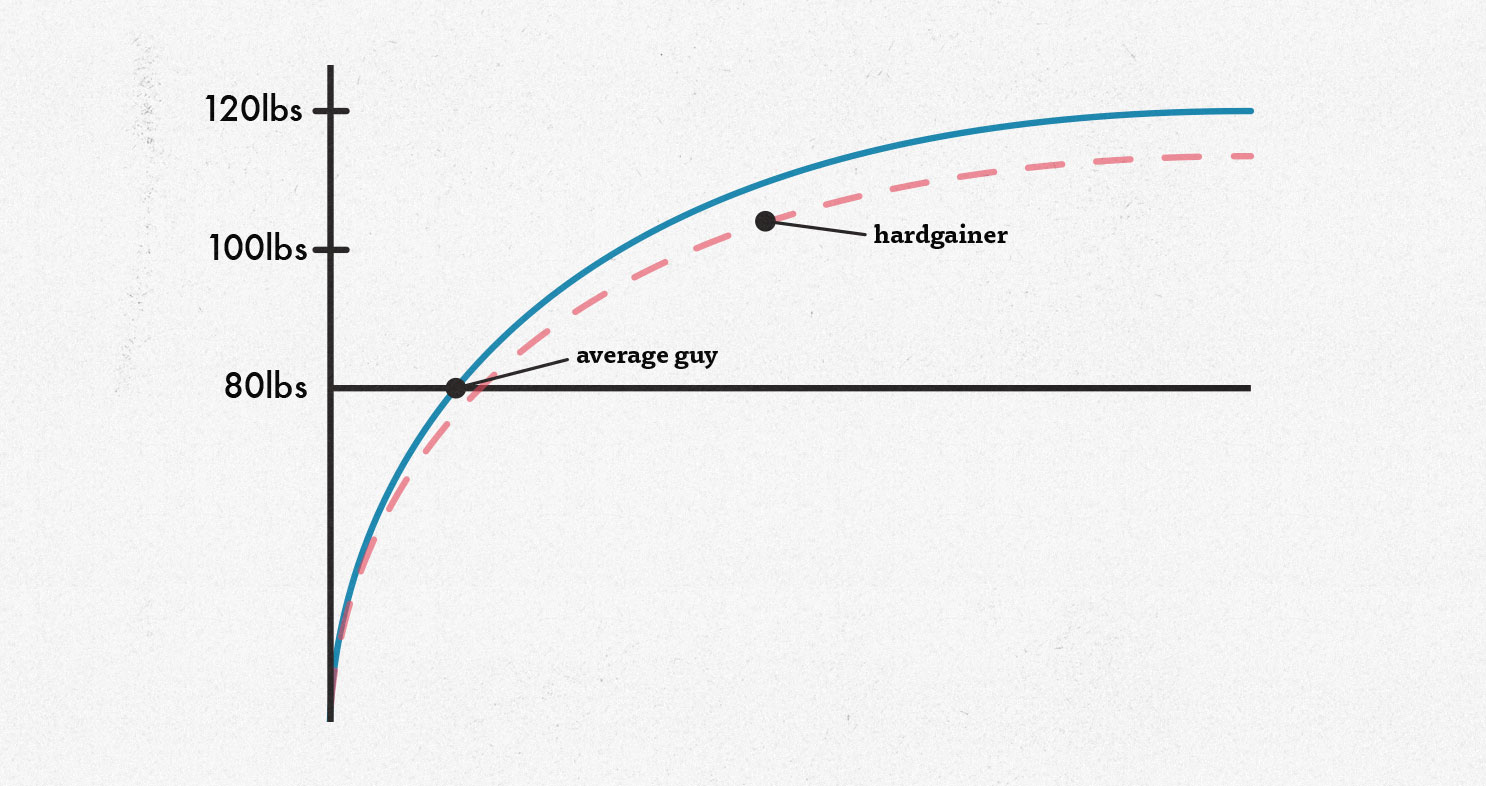
Our 130-pound ectomorph beginner, though, still only has forty pounds of muscle. That means that he still has 68–74 pounds of muscle to gain before he starts butting up against his genetic potential. That’s an absolutely insane amount of muscle that he can gain over the course of his lifetime, most of which he could theoretically gain during his first couple of years of proper bulking.
Compared to the other male body types, yes, ectomorphs start off with less muscle, but our genetics aren’t nearly as limiting as most of us think they are. With some heavy metal and protein shakes, we’re able to completely transform our physiques.
As we showed above, it’s almost like ectomorphs get multiple rounds of newbie gains, allowing us to catch up to other guys incredibly quickly. At that point, through cleverness and a good work ethic, we have every opportunity to blow past them.
How Quickly Can Ectomorphs Gain Muscle?
Skinny guys can gain muscle quickly at first. However, the more muscle we gain, the more our growth will slow. The law of diminishing returns kicks in. Eventually, those kicks will get quite painful.
We have our ectomorph newbie gains, where we bulk up insanely quickly. This often allows us to shoot past the average non-lifter. Here’s a remarkable example of that:

Then, because we’re no longer skinny, we have more typical newbie gains, where most of us can expect to gain around two pounds per month without a noticeable increase in body-fat percentage. This usually allows us to catch up to the other casual lifters over the course of a year or so, earning us a totally athletic and attractive physique.
Here’s an example of the progress some ectomorphs can make with just a single year of lifting:

Once we reach an intermediate bulking level, we can expect to start gaining muscle at a slower rate. It also becomes hard to add more muscle mass. We need to start following especially well-programmed lifting routines as well as actively overcoming plateaus. This is also where we might need to start bringing up weak or lagging muscle groups.
The good news is that by the time our progress really begins to slow, we’re already quite strong and muscular, and we’ve hopefully developed good skills, knowledge, and habits. Yes, it takes longer to see further improvements, but we already look and feel awesome, so there’s less urgency to it. For example, here’s JoeBrusk going from having an awesome physique to having an incredible physique:

Compared to Dan gaining thirty pounds in ten weeks, gaining an estimated eight pounds of muscle over the course of five months might not sound like a lot, but that’s actually quite rapid progress for someone who’s already built such a solid foundation.
Now, again, keep in mind that these are specific examples. Your results will surely vary. Everyone gains muscle a little differently.
Okay, now let’s talk about strength standards for ectomorphs.
How Strong Can an Ectomorph Get With a Year of Lifting?
Most ectomorphs are able to laugh at the muscle growth standards, shooting way past them. With average male strength standards, though, we have the opposite problem: they seem totally unrealistic. Why do we keep hearing that within our first year of lifting, we should be able to bench press over 225 pounds? That’s insane!
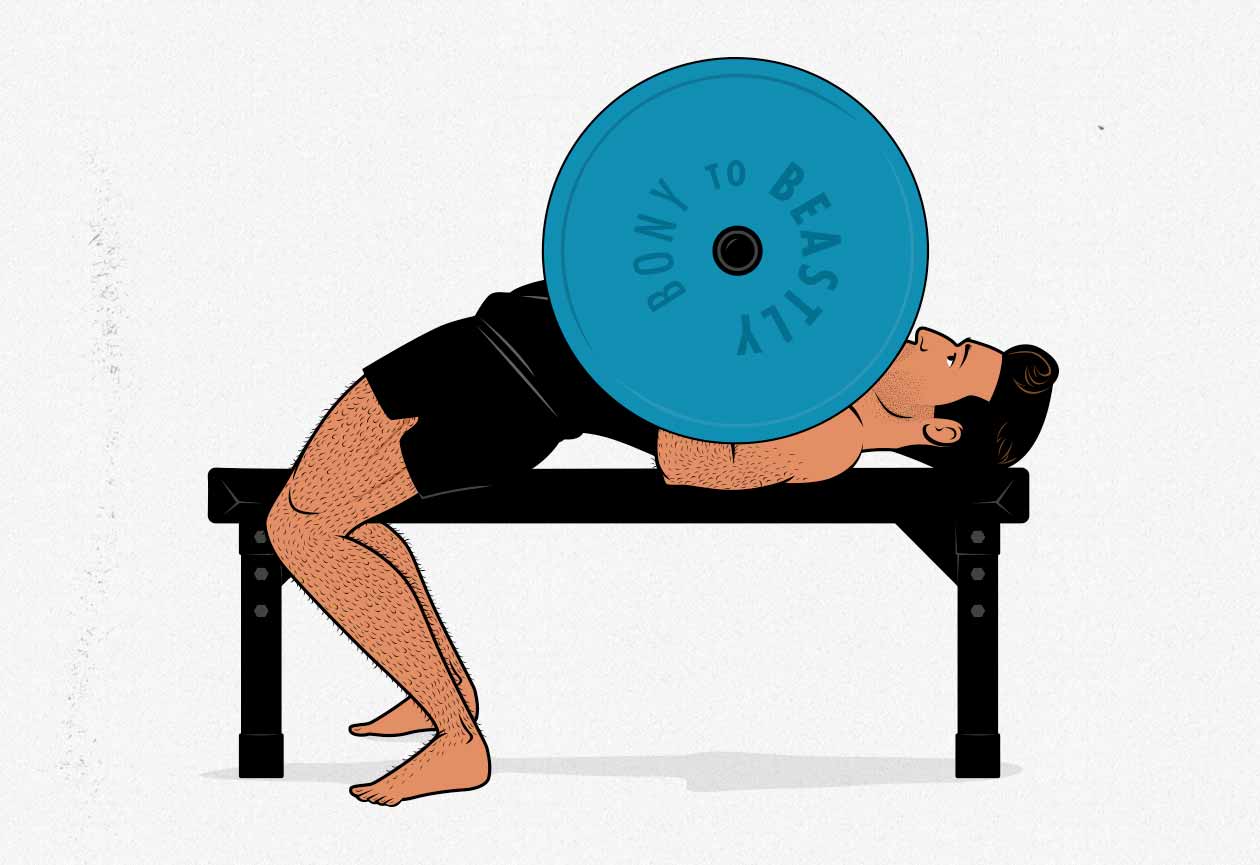
So, first of all, where do these strength standards come from? As far as I can tell, the most credible source that’s looked into this is Greg Nuckols, MA, from Stronger by Science (an incredible strength training blog). He took a survey of his readers, all of whom are serious about both powerlifting and science but who ranged from beginners all the way up to advanced lifters.
Greg found that within a year of serious lifting, the average guy was able to bench press 235 pounds. Furthermore, he mentions that with proper workout programming and coaching, most guys should be able to do even better than that.
However, we also need to consider how much these guys were able to bench press when they started lifting. In this case, the men started off benching around 188 pounds. So, within their first year of lifting, they only added 50 pounds to the bar. They were adding less than five pounds to the bar each month. This is an “aha” moment for a lot of us skinny guys.
It’s not that ectomorphs gain strength more slowly; it’s that we start off behind the starting line. When we surveyed our readers, most skinny beginners could bench less than 135 pounds. But, similar to how we can build muscle far more quickly than the average guy, we can also gain strength far more quickly. It just takes a little while for us to catch up.
To Match Strength, We Must Match Muscle
The main thing to keep in mind when thinking about our genetic strength potential is that it’s closely tied to our muscular potential. In order to reach our strength potential, we first need to reach our muscular potential. Fortunately, strength and size are a happy couple that enjoys strolling hand in hand along the beach. Most things that increase strength can also increase muscle mass and vice versa.
When we’re looking at this 235-pound target, we need to keep in mind that we’re talking about the average man here. The average man starts off with roughly 80 pounds of muscle mass. Then, during his first year of lifting, he can increase to around 100 pounds of overall muscle mass. That means that he only needs to bulk up his chest muscles a tiny bit to have the horsepower he needs to bench 235 pounds.
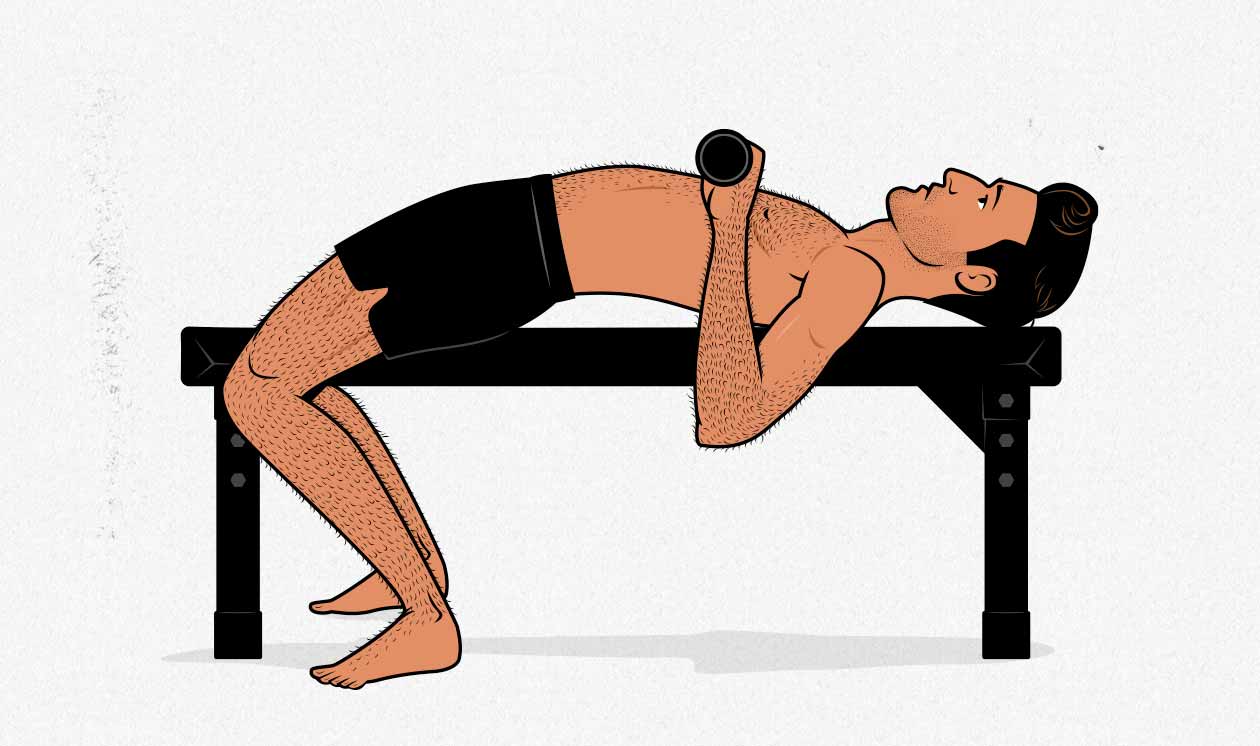
So to understand why our strength is starting off so much lower, we need to consider how much muscle mass we’re starting off with. Consider the 130-pound ectomorph from our example. He’s only starting with forty pounds of muscle, so he doesn’t have anywhere close to the amount of muscle mass required to bench press 185 pounds, let alone 235.
As a naturally skinny guy, I mean, I don’t know about you, but when I first started bench pressing, I was benching fifty pounds for six reps. Rounding up, that puts my estimated one-rep max at 60 pounds. Worse, I wasn’t even able to bring the barbell down to my chest. Technically, I couldn’t even get a single rep with the 45-pound bar.
At the time, I figured I was at a disadvantage because I was an ectomorph. I had a thin torso, long arms, and just generally bad genetics for the bench press. That can make the bench press harder for ectomorphs to learn, for sure, and it explains why I couldn’t bring the barbell down to my chest, but a new study confirms that bench press strength is directly correlated with the amount of muscle someone has in their chest, upper arms, and shoulders.
Bench press strength has almost nothing to do with body proportions. It has almost nothing to do with skill, either. It’s a movement that requires sheer muscle mass. Once we build the muscle, we’ll have the strength.

In my case, at 6’2 and 130 pounds, it stands to reason that I was only benching fifty pounds. I still had a small chest, small arms, and small shoulders. I wasn’t weak because of my lanky proportions, I was weak because I had so little muscle mass on my frame.
What do Conventional Strength Standards Mean for Ectomorphs?
Not much, unless we also factor in muscle mass. So let’s do that. The average man starts off with eighty pounds of muscle and can bench press 188 pounds. During his first year of lifting, he gains twenty pounds and moves his bench press up to 235 pounds.
If strength is indeed directly related to muscle mass, then in order to even bench press 188 pounds, I’d need to match his muscle mass pound for pound. To do that, I’d need to gain an estimated forty pounds of muscle. Then, in order to bench press 235 pounds, I’d need to gain another twenty pounds on top of that.
In my case, this theory held true. I gained 55 pounds within my first couple of years of lifting, going from 130 up to 185 pounds, with a body fat percentage of 11% (as measured by DEXA). Again, no drugs or secrets, just a good bulking program:
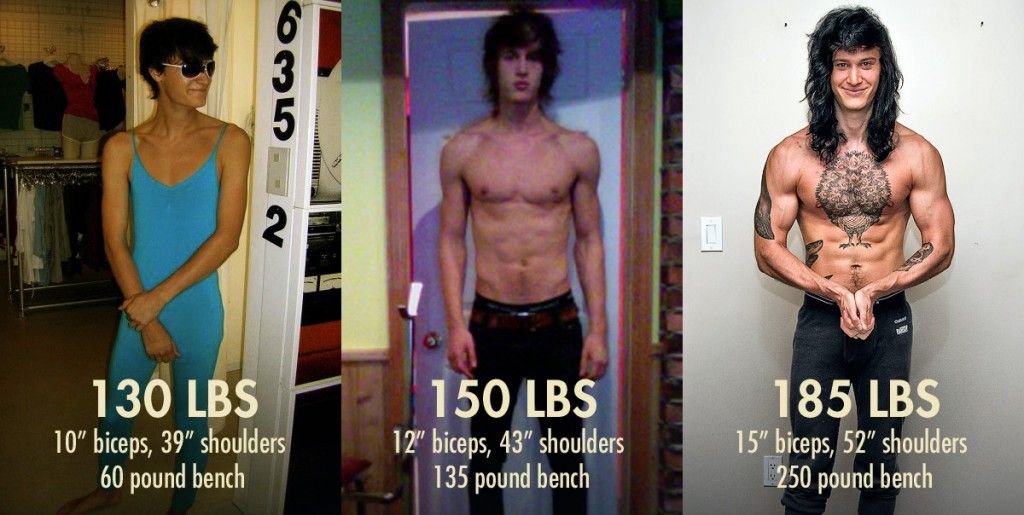
By the time I had gained 55 pounds, I was benching around 250, squatting around 275, and deadlifting around 365 pounds. When I got more serious about my squat and deadlift, they popped up to 315 and 405 over the course of another couple of months. Once I had a solid amount of muscle mass, my strength hit those targets without a problem.
To be fair, I hit both a size and a strength plateau at around 150 pounds, and if it weren’t for Marco coaching me through the process, I probably would have stayed stuck there for quite a while. (Here’s our article on how we went from skinny to muscular.)
I know, I know. Even taking into account that I had a world-class strength coach guiding me through half of this bulk, I realize this rate of weight gain sounds remarkable. Now, keep in mind that not all of the weight I gained was muscle. My bones got denser, my connective tissue got stronger, I gained some fat, and I grew my hair out.
Still, much of the weight I gained was muscle, and for many guys, gaining that much muscle would be unrealistic. But keep in mind that it took me two years of lifting to reach the size and strength standards that most guys can reach within a single year. My progress may seem remarkable, but remember that I had to train for a year just to make it to the starting line.
For another example, Marco is 6’4 and started off his adult life weighing around 150 pounds. He gained 65 pounds over the course of a few years, bumping up to 215 pounds at a little under 10% body fat. At that point, he was benching 250, squatting 315, and deadlifting 450. Again, once he gained enough muscle mass, he was able to achieve those strength targets without an issue.
If we want to get strong, we have to get big; if we want to get big, we have to get strong. And for us skinny guys trying to become big and strong, that’s perfect.
Anyway, all things considered, it takes ectomorphs a little longer to build a big and strong physique. Not that much longer, mind you—maybe an extra 6–12 months, depending on how skinny you are right now. If you aren’t as skinny as I was, don’t expect to gain muscle as quickly as I did, but do expect to bench press 250 sooner than I was able to.
Ectomorphs Also Have a Natural Strength
Lamenting about our lack of natural muscle size and strength can certainly be satisfying, but we also have a pretty cool advantage: skinny guys have naturally lower body-fat percentages.
Even skinny-fat guys aren’t dealing with the same propensity for obesity that the average guy is—not even close. And the more muscle we gain, the easier it becomes to stay lean (study). If a skinny-fat guy gains 40–50 pounds of muscle, gets in the habit of lifting, and starts eating a better diet, staying lean will become second nature. (Here’s our guide for skinny-fat guys.)
In fact, most of us skinny guys don’t have abs because our ab muscles are too small, not because our body fat percentage is too high. Our problem is flipped around backwards.
That’s the edge ectomorphs have. We can often build muscle quite quickly, and if we do it properly, we’ll be able to maintain a lean and muscular physique year-round.
Besides, even if we’re only able to get 90–95% as big as the average serious lifetime lifter, that’s still an incredible degree of muscularity. With good training, most of us should eventually be able to bench over 315 pounds, squat over 450, and deadlift over 500. That’s plenty.
But wait a second. If you train at a standard gym, you may have noticed that the vast majority of ectomorphs stay skinny forever. And Hell, even most naturally strong guys with a decade of lifting experience aren’t deadlifting anywhere close to even 400 pounds.
In fact, if you do a set of deadlifts with four plates on the bar in a commercial gym, you’re going to draw stares. Guys will probably come up to you and ask for lifting advice.
Why Do So Many Ectomorphs Struggle to Bulk Up?
The good news is that it has nothing to do with genetic variation. As I mentioned above, even if you’re an ectomorph, you can almost certainly still get your bench press over 300 pounds, your squat over 400, and your deadlift over 500. The trick is that you need to build a bunch of muscle in order to do it (which is probably your main goal anyway, so that’s great).
The real reason that most people fail to make progress is that:
- They refuse to follow good bulking programs. Maybe they want to do this without spending any money. Or maybe they spend money on the programs with the fanciest marketing instead of by looking at the education and credentials of the people making it. Or maybe they follow programs designed for people on drugs. There are a lot of great programs out there, but there are also a lot of bad ones.
- They don’t use coaches. Right when we started beta testing the very first version of our bulking program, we realized that we needed to include online coaching with every membership. We know that our members are going to run into problems and plateaus. They’re going to have unique circumstances. They’ll benefit from feedback on their lifting technique. We need to be there to help them through that. That’s the only way that we can guarantee progress.
- Intermediate lifters fail to put in enough effort.
- Beginners lack consistency.
People who follow a good lifting routine, eat a good bulking diet and focus on gradually gain strength are able to accomplish incredible things, blowing past the average lifter in no time. But if you aren’t bulking properly, ectomorph or not, you’re not going to gain enough muscle mass to get anywhere even close to these muscle growth or strength targets.
The other thing to keep in mind is that progress requires getting a few things right all at once. If you aren’t bulking properly, it’s not that you’ll progress more slowly; it’s that you won’t progress at all. No matter how diligently you persist, zero gains per week will still add up to zero gains per year.
In fact, it’s possible to spend decades lifting weights without ever gaining more than 10–20 pounds of muscle and without ever even matching the strength of a guy who followed a good program for a single year. If you never bulk properly, you might go your entire life without ever knowing what it’s like to be big and strong.
This is great news in the sense that we have every opportunity to become far better than average. But it’s bad news if you were hoping that this would be a walk in the park.
Your Doubts Are a Greater Limitation Than Your Genetics
There’s also the issue of people underestimating their potential, which is why I wanted to write this article in the first place. A recent study published in Nature split the participants into two random groups. Half the participants were told that they were genetically gifted, and the other half were told that they were at a genetic disadvantage. Those who thought they were genetically gifted performed markedly better. (Greg Nuckols wrote up a good breakdown of the study here.)
To reach your full potential, you have to expect a lot of yourself and then fight for it. If you keep thinking that being an ectomorph is holding you back, it will.
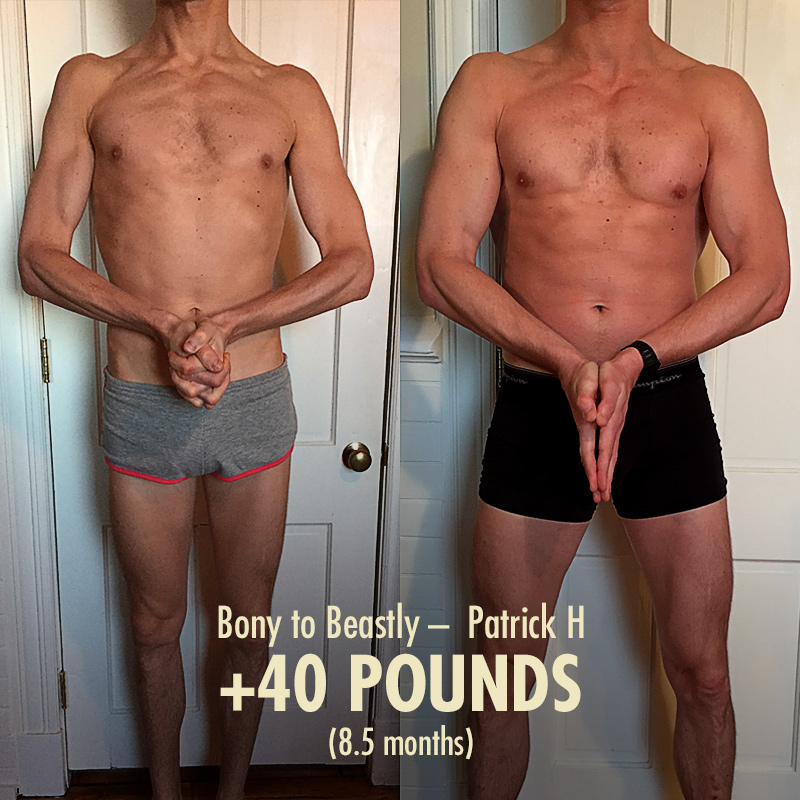
What’s Our Genetic Muscle Size and Strength Potential?
- Ectomorphs start off with less muscle mass, but we catch up quickly. While we’re underweight, we’re often able to build muscle at a tremendous pace, often gaining 20+ pounds in just our first couple months of lifting and up to forty pounds within our first year. Then, when we get up to a more average size, we can expect to gain muscle at a more average rate.
- Strength and size are almost perfectly correlated. Until we’ve gained as much muscle mass as the average lifter, we shouldn’t expect to be able to lift as much as him. That might mean that we need to gain 20–40 pounds of muscle before we’re able to lift as much as they are, which can add an extra 6–18 months before we’re able to hit the strength targets of bench pressing 235, squatting 330, and deadlifting 405 pounds. (Keep in mind that although strength and size are virtually the same things, that doesn’t mean that strength training is ideal for gaining muscle size. If you’re trying to gain muscle size, hypertrophy training is better.)
- Our potential is quite high. Most people aren’t failing to hit these standards because of genetic limitations; they’re failing because they aren’t following good programs, they aren’t seeking the advice of qualified strength and conditioning coaches, and they aren’t pushing themselves consistently.

Alright, that’s it for now. If you want to know the ins and outs of bulking up, we have a free newsletter. If you want a full muscle-building program, including a 5-month workout routine, a bulking diet guide, a gain-easy recipe book, and online coaching, check out our Bony to Beastly Bulking Program. Or, if you want a customizable intermediate bulking program, check out our Outlift Program.

